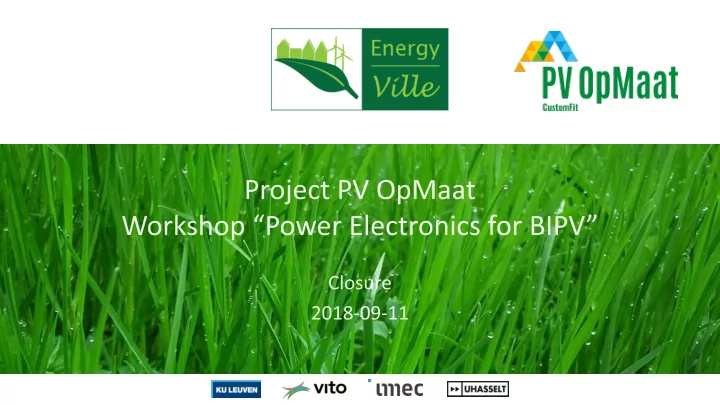

Agenda morning Welcome reception 11:00 – 11:30 Session 1: BIPV + PE interplay 11:30 – 13:00 Welcome Ronnie Belmans (EnergyVille/KU Leuven) PV OpMaat project Ando Kuypers (Solliance) EnergyVille Introduction Johan Driesen (EnergyVille / KU Leuven) Requirements for BIPV Electronics Stefan Dewallef (Soltech) Lunch + networking 13:00 – 14:00 Lab Tour, EnergyVille 1 14:00 – 14:30
Agenda afternoon Lab Tour, EnergyVille 1 14:00 – 14:30 Session 2: PE technology 14:30 – 16:00 Module-level converters for BIPV Simon Ravyts (EnergyVille / KU Leuven) Reliability challenges for module-level converters Wieland Van De Sande (EnergyVille / U Hasselt) Certification of PV Modules and Electronics Norbert Lenck (VDE Renewables) Break 16:00 – 16:15 Interactive roadmap to solutions 16:15 – 17:00 Closing reception 17:00
Q&A Session • To what extent can efficiency be sacrificed in favor of reliability? (Stefan, Wieland) • Most important trade-off with efficiency is by power de-rating at high temperature (Stefan D.) • More important trade-offs of reliability (and efficiency) are vs. cost and size • De-rating in extreme conditions is ok, but cannot occur regularly in order not to reduce energy yield (as it does with some microinverters) • How should we tackle the lack of models for failure on all components? (Wieland, Stefan) • Component and/or converter manufacturers should collaborate with research institutions to develop them • This would require a physics-of-failure based test for specific components, e.g. capacitors (input from Geert Willems, imec)
Q&A Session • What is the size of a “standard” BIPV module? (Simon ) • Stefan D.: No real standard, 20 cell is Soltech’s minimum, size is adapted to façade requirements – sticking to 1 m width has the advantage that one person can carry it • Comments about earth fault of PV (Simon) • Depends on the grounding method chosen (TN- S, IT, …) • Single earth fault is not dangerous if PV is isolated • Is the lifetime calculation verified by tests? (Wieland) • There is no way to accurately predict 25 years of lifetime for any electronics (Geert) • Linear failure rate assumption is most certainly wrong, only applies to random causes of failure
Q&A Session • How do we know that the testing profile is relevant to the operational life of the PV application? (All) • Standard IEC tests do not aim at guaranteeing a lifetime (Norbert L., VDE) • Multiplication of test duration(e.g. Damp Heat) increases safety • Test procedures are not specific to BIPV (as of yet) • How to create more awareness in Architects / Designers around BIPV concepts/benefits? (All) • They all have (or should have) heard about it by now • Most importantly their customers have to want it
Conclusions • Criteria influencing power electronics for BIPV the most (in that order): reliability, size, cost • Lifetimes of > 25 years cannot be ensured • Thus converters have to be replaceable / repaireable • Detailed physics-of-failure investigations are needed to ensure reliability • In DC converters, electrolytic capacitors can be avoided, which are most critical in lifetime Wait… wasn’t there a roadmap promised? Well, these topics are, or will be, included in our roadmap, and we will be working on them to make BIPV (more) viable! Stay in touch for details. Thanks to all for your input!
Ranking Feedback • 13 participants gave Feedback - Rating feedback • Many appreciated making 9 new contacts 8 7 • Quality of presentations 6 5 ranked good or very good 4 Contacts 3 by most 2 Roadmap 1 Well presented 0 no little Relevant quite yes very 0-1 1-2 2-3 3-4 4-5 5-6 6-7 7-8 8-9
Textual Feedback Liked: Lacking: • Practical info from Soltech • More technical power converter / topology / simulation info • Confirmation of EnergyVille's • Power converter cost & efficiency info ideas • Good contact possibilities • Real life info • Content of presentations • Percentage of power electronics presentations too low • Lab tour • How to design for guaranteed lifetime • Breadth & depth of topics • Influence of thermal management on output and lifetime • Work that was actually done in PV OpMaat
Thank you for your participation!
Recommend
More recommend